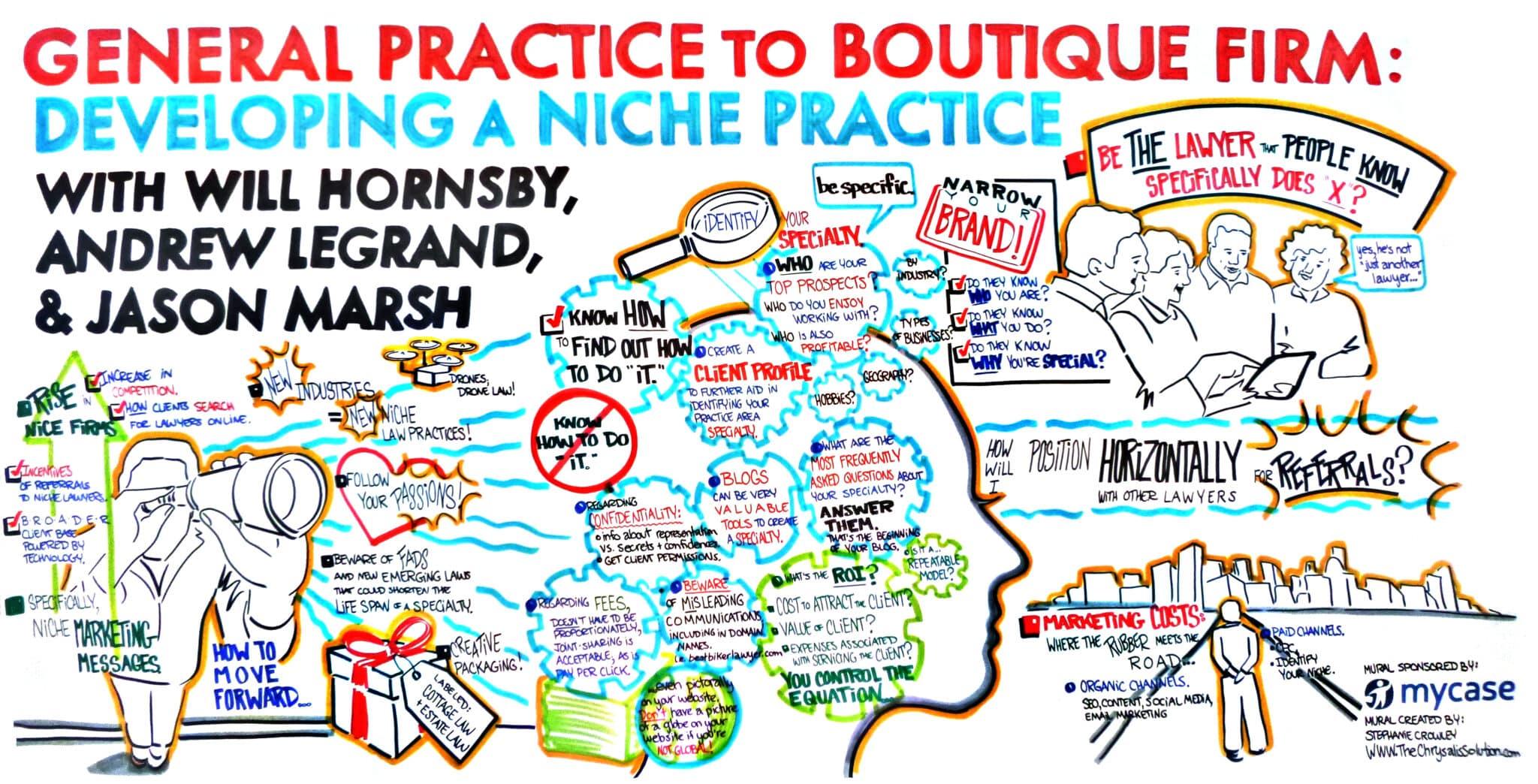Oftentimes when lawyers first hang their shingle, they’re inclined to take any case that comes in the door. After all, when you’re starting out, it can be tough to turn away work. That’s why many solo and small law firms start out as general practices.
But after a while, as you identify the areas of law that interest you most, it becomes time to winnow down your areas of focus and to accept only those matters that truly inspire you to practice law. But how exactly do you go about doing that? And how do you lay the groundwork so that your newly focused niche practice will be a successful one?
Those very issues were discussed at an ABA Techshow panel in March, “General Practice to Boutique Firm, Developing a Niche Practice.” During this presentation, Will Hornsby, Andrew Legrand, and Jason Marsh offered tips on successfully establishing and marketing a niche law practice, while Stephanie Crowley took visual notes of this session on behalf of MyCase.
Below you’ll find the visual notes from that session along with some of our favorite tips and links to sites that provide further information (click to view larger image):

1) Follow your passions
This piece of advice from the presenters should be obvious, but even so, it’s important to emphasize how important it is to ensure that you actually enjoy practicing the areas of law that you’re considering focusing one. So often we end up pursuing the easiest path rather than seeking out the right one. So when it comes to choosing your niche areas of focus, make sure you’ve identified practice areas that inspire you each and every day. Practice law that makes you feel good about yourself and the clients that you’re serving, not the kind of cases you think you should be handling. There’s a difference and it’s an important one. Choosing your niche practice carefully can make all the difference in the world.
2) Create a client profile
Another recommendation from the presenters is to create a client profile for your niche practice. That profile will help ensure that you’ve chosen the right niche(s) for your needs and will also drive all of your marketing and client service choices.
As Allison Shields, an attorney and marketing and practice management consultant, explains in a post on the Legal Ease Blog, creating a client profile offers many long term benefits:
It is only when you have a good picture of who your ideal clients are that you can move forward to determine what is important to them, where to find them, how to attract them, how best to serve them, what processes and procedures need to be in place, what employees will work best with those clients, and more.
In that same post, Allison offers a wealth of information on how to go about creating the ideal client profile for your niche law practice, so make sure to give it a read.
3) Narrow your brand
The next step, according to the presenters, is to narrow your law firm’s brand. They suggest you ask yourself the following questions:
Do your potential clients know who you are?
Do they know what you do?
Do they know why you’re special?
Of course, the trick to reaching the right answers to those questions is to ensure that you’ve identified what you want your firm’s brand to be and then taking steps to share that information in effective ways. For tips on how to do this, check out this Attorney at Work post on branding for small law firms. It’s full of great ideas from the experts on how to make your small law firm stand out by creating an effective brand for your niche market.
4) Set yourself up for referrals from other lawyers
The presenters also suggest that you consider ways to position yourself horizontally with other lawyers so that they’ll refer you cases in your niche practice area. For lots of great tips on offline marketing and how to connect with other lawyers and referral sources as a way to drive new clients to your firm, make sure to download this ebook, Launching Your Law Firm: Offline Networking. In it, you’ll find a host of great tips and advice to help you enhance your offline networking and increase referrals from other lawyers.
5) Market effectively to your niche target clients
And last, but not least, set up a marketing plan that makes it easy for potential clients to find your new niche practice. The presenters advise using both paid and organic online channels to reach potential clients.
There are many ways to market to a niche audience. The trick is finding the right channels for your particular niche. The best way to do this is to truly understand your potential clients, as Jaime Field explains in this ABA GPSolo post:
In order to be successful in any rainmaking endeavor, you have to create a rapport and trust with the people you would like as clients. This means that you have to begin devoting yourself to knowing everything you can about the industry or group you would like to cultivate as clients.
First, take the time to find out everything you can about the industry or niche that you have chosen. Find out where they exchange information, what magazines they read, to what associations they belong, what television shows they watch, what books they are reading, and what websites they are visiting. What is your industry or niche talking about to each other? In marketing, it is called “listening” to your target.
Make sure to read the entire post for lots of great advice on how to market your niche law practice.